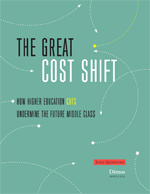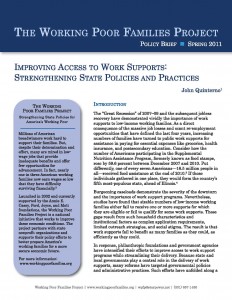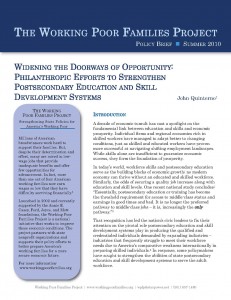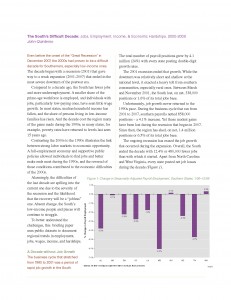Our Projects
04.04.2012
News Releases, Our Projects, Policy Points
 Completed in early 2012 for Demos, a public policy organization in New York City, The Great Cost Shift: How Higher Education Cuts Undermine The Future Middle Class, examines how state disinvestment in public higher education over the past two decades has shifted costs to students and their families. Such disinvestment has occurred alongside rapidly rising enrollments and demographic shifts that are yielding more economically, racially, and ethnically diverse student bodies. As a result students and their families now pay—or borrow—a lot more for a college degree or are getting priced out of an education that has become a requirement for getting a decent job and entering the middle class.
Completed in early 2012 for Demos, a public policy organization in New York City, The Great Cost Shift: How Higher Education Cuts Undermine The Future Middle Class, examines how state disinvestment in public higher education over the past two decades has shifted costs to students and their families. Such disinvestment has occurred alongside rapidly rising enrollments and demographic shifts that are yielding more economically, racially, and ethnically diverse student bodies. As a result students and their families now pay—or borrow—a lot more for a college degree or are getting priced out of an education that has become a requirement for getting a decent job and entering the middle class.
The study traces trends in the size and composition of the young adult population and analyzes patterns in state support for public higher education over the past two decades. Trends in tuition and financial aid are also examined and policy recommendations are presented for ways to renew America’s commitment to nurturing a strong and inclusive middle class through investments in public higher education.
18.02.2012
Our Projects
Issues related to performance measurement long have bedeviled federal workforce development programs. The challenges associated with gauging success have only grown more pronounced during the “Great Recession,” a time when jobs have proven scarce. What is an acceptable workforce development outcome during a “jobless” recovery? Which metrics are appropriate for gauging a program’s performance? What are reasonable benchmarks to use?
To help answer such questions, the North Carolina Rural Economic Development Center commissioned South by North Strategies, Ltd. in 2011 to document changes in local labor markets during the Great Recession, scan how other jurisdictions have used supplemental federal workforce funding extended under the American Recovery and Reinvestment Act, and interpret outcome data from demonstration workforce development projects in light of local economic conditions and the performance of area workforce development programs serving adult and dislocated workers.
The resulting report served as a companion to a formal evaluation of the Rural Community Mobilization Project, a statewide initiative coordinated by the Rural Center that used federal Recovery Act funds to support local projects striving to address the economic problems of rural communities and assist unemployed and underemployed rural residents.
09.06.2011
Our Projects, Policy Points
 The Great Recession has demonstrated the importance of work supports to low-income working families. Recently, foundations and government agencies have intensified efforts to improve access to work supports while streamlining their delivery.
The Great Recession has demonstrated the importance of work supports to low-income working families. Recently, foundations and government agencies have intensified efforts to improve access to work supports while streamlining their delivery.
A policy brief prepared by South by North Strategies, Ltd. for The Working Poor Families Project explored ongoing initiatives and examined how the Project’s state partners could support and advance efforts aimed at strengthening public work support programs. In particular, the brief identified five state policy areas for the Project’s state partners to consider and potentially pursue.
08.09.2010
News Releases, Our Projects, Policy Points
 Strengthening state postsecondary education and skill development systems – systems that encompass such programs as technical education, literacy instruction, and occupational training – requires comprehensive changes to public policies and institutional practices. To that end, various philanthropic foundations recently have launched ambitious, multi-state, multi-year efforts to raise the educational attainment of Americans.
Strengthening state postsecondary education and skill development systems – systems that encompass such programs as technical education, literacy instruction, and occupational training – requires comprehensive changes to public policies and institutional practices. To that end, various philanthropic foundations recently have launched ambitious, multi-state, multi-year efforts to raise the educational attainment of Americans.
To boost understanding of the recent wave of philanthropic interest in state postsecondary education and skills development systems, The Working Poor Families Project, a national initiative to strengthen state policies and programs, asked South by North Strategies, Ltd. to identify several reform efforts designed to expand the opportunities available to low-income working families.
The resulting report, Widening The Doorways of Opportunity, profiles seven efforts: Achieving the Dream, the Postsecondary Success Initiative, Complete College America, Breaking Through, the Developmental Education Initiative, the National Fund for Workforce Solutions, and Shifting Gears.
04.08.2010
News Releases, Our Projects, Policy Points
 Even before the onset of the “Great Recession” in December 2007, the 2000s had proven to be a difficult decade for working Southerners. Across the region, the 2000s were a period marked by meager job growth, rising joblessness, rapid industrial change, and mounting economic hardships. And the decade’s developments offset many of the gains – most notably against poverty – made by the region during the 1990s.
Even before the onset of the “Great Recession” in December 2007, the 2000s had proven to be a difficult decade for working Southerners. Across the region, the 2000s were a period marked by meager job growth, rising joblessness, rapid industrial change, and mounting economic hardships. And the decade’s developments offset many of the gains – most notably against poverty – made by the region during the 1990s.
These findings come from the recent briefing paper, The South’s Difficult Decade, prepared by South by North Strategies, Ltd. for The Mary Reynolds Babcock Foundation in Winston-Salem, NC.
The brief summarizes key economic changes that occurred between 2000 and 2009 in the ten states where the foundation is active: Alabama, Arkansas, Georgia, Kentucky, Louisiana, Mississippi, North Carolina, South Carolina, Tennessee, and West Virginia.
 Completed in early 2012 for Demos, a public policy organization in New York City, The Great Cost Shift: How Higher Education Cuts Undermine The Future Middle Class, examines how state disinvestment in public higher education over the past two decades has shifted costs to students and their families. Such disinvestment has occurred alongside rapidly rising enrollments and demographic shifts that are yielding more economically, racially, and ethnically diverse student bodies. As a result students and their families now pay—or borrow—a lot more for a college degree or are getting priced out of an education that has become a requirement for getting a decent job and entering the middle class.
Completed in early 2012 for Demos, a public policy organization in New York City, The Great Cost Shift: How Higher Education Cuts Undermine The Future Middle Class, examines how state disinvestment in public higher education over the past two decades has shifted costs to students and their families. Such disinvestment has occurred alongside rapidly rising enrollments and demographic shifts that are yielding more economically, racially, and ethnically diverse student bodies. As a result students and their families now pay—or borrow—a lot more for a college degree or are getting priced out of an education that has become a requirement for getting a decent job and entering the middle class.



 Email Sign-Up
Email Sign-Up RSS Feed
RSS Feed